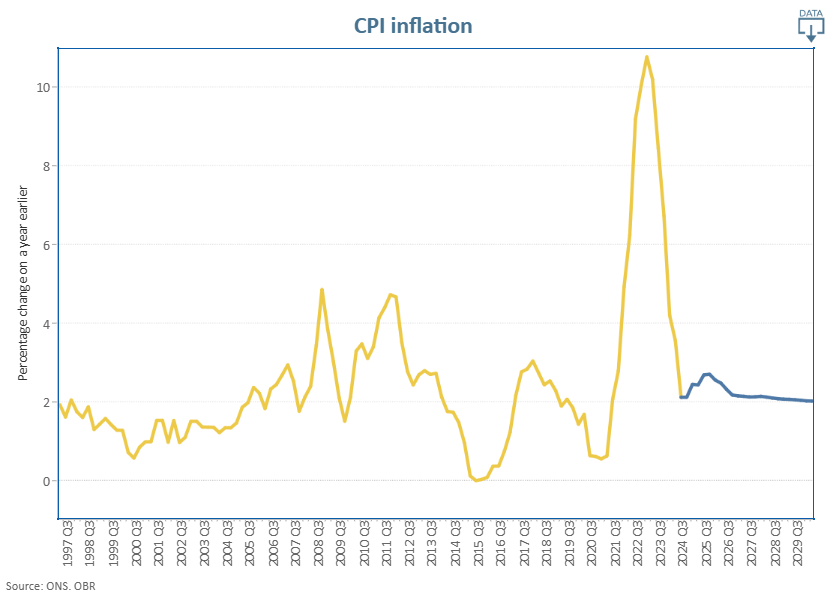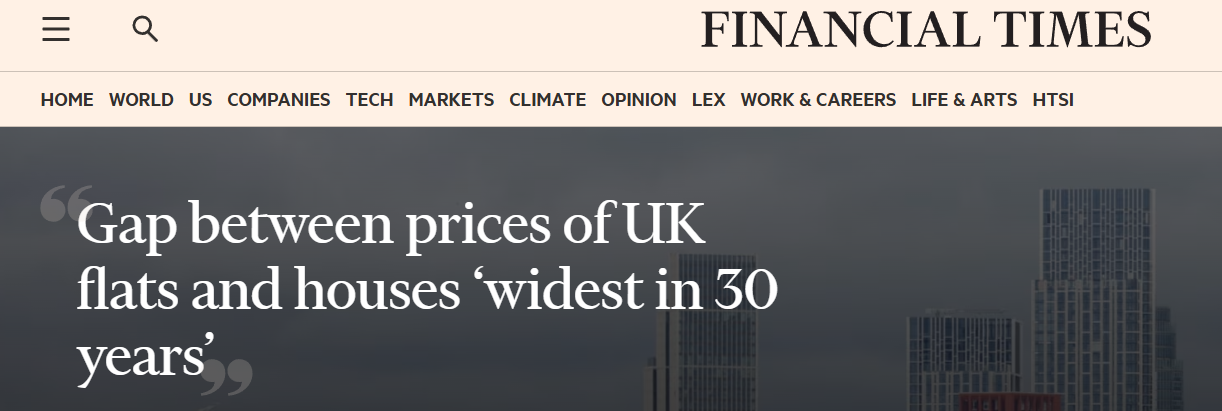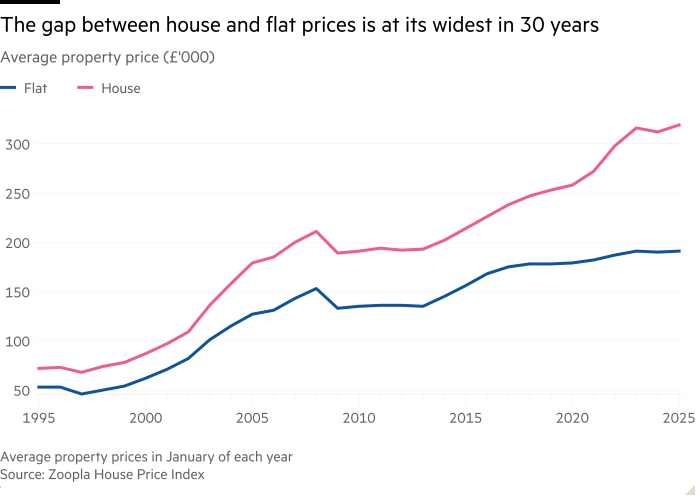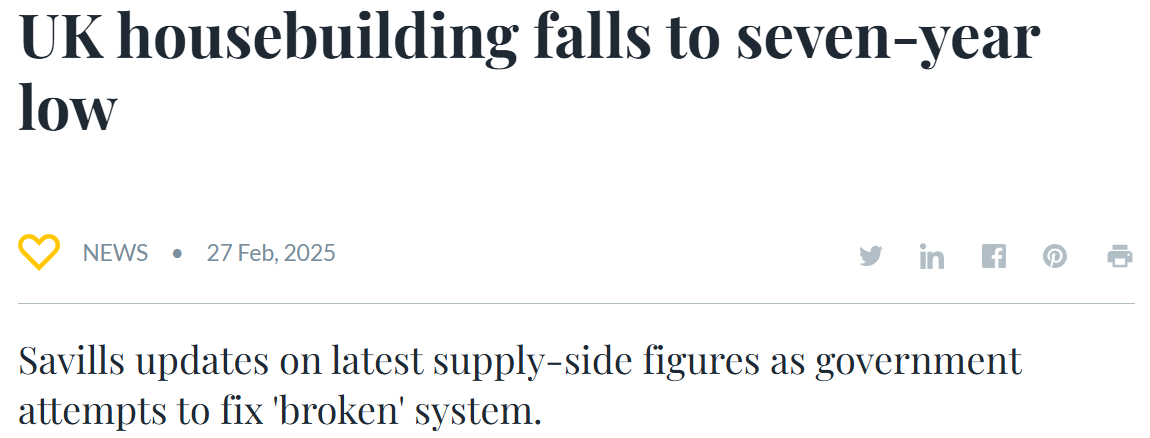1. UK inflation continues to rise
The latest announcement from the UK's Office of the Energy Regulator (Ofgem) to increase the energy price cap by £111 from April 2025 will see the average household spend £1,849 on annual energy bills.

The Bank of England has been forced to slow the pace of interest rate cuts as rising energy prices in the UK will further exacerbate inflationary pressures. As a result, the Pound exchange rate has shown a sustained rebound in recent times.
Market data shows that the Pound to Renminbi exchange rate once exceeded the 9.19 mark, as of 2.28 there is a downward trend. The past month is still showing a slow upward trend. After the release of the relevant data, the Bank of England predicted that inflation would climb to a peak of 3.7% in the third quarter of this year, and would then gradually fall back.

2. The price difference between UK villas and flats hit a 30-year high
The price gap between UK cottages and flats has widened to a 30-year high, according to Zoopla. The research suggests that in January 2025, the average selling price of a villa in the UK will be £319,500, while the average selling price of a flat will be £191,300.This means that the average price of a villa is 1.7 times that of a flat, a gap that is the largest since 1995.

London's stagnant house prices are largely due to affordability pressures on homebuyers, with Halifax data showing that London's house price to income ratio is a staggering 8.22, well above the national average of 6.55, meaning that it would take a middle-income London household nearly 8.3 years of paying nothing to buy a medium-priced home.
Richard Donnell, Zoopla's executive director, points out that ‘there has always been a price gap between villas and flats, which has widened further during the epidemic as homebuyers have preferred properties with more space.’

The data also suggests that the property market will continue its ‘positive trend’ in 2025. In the first six weeks of 2025, all key measures of market activity have seen double-digit growth. In particular, the number of homes sold is up 10 per cent year-over-year and the number of homes for sale is up 11 per cent year-over-year. In addition, average house prices grew at an annual rate of 1.9 per cent in the year to January 2025.
3. UK house building falls to seven-year low
The latest figures show that housebuilding in the UK has fallen to a seven-year low. There is a high probability that the oversupply in the property market will continue for some time to come.

According to Savills' analysis of EPC data, excluding the period of the New Crown epidemic, 2024 saw the lowest number of new homes built since 2017. total house completions in 2024 were just 217,911, a marked reduction from 231,000 in 2023 and over 253,000 in 2022, and annual completions have fallen for four consecutive quarters.
The organisation cautions that while the Government has introduced sweeping reforms in 2024 that may boost housing delivery and speed up the planning process, it will take time for these reforms to have a greater impact. Meanwhile, Savills pointed to a ‘significant shortfall’ in the number of homes receiving permissions. Estimates from Glenigan and HBF suggest that only around 245,000 homes will have full planning permission in 2024.

In terms of building starts, after a sharp decline in 2023, they picked up in 2024. Large housebuilders drove this trend, with the top ten companies seeing a 15% increase in starts in Q4 compared to Q3, leaving full year starts in 2024 just 4% lower than in 2023. However, smaller firms saw slower growth in starts, which remain 36 per cent below 2023. As a result of lower completions, demand continues to outstrip supply in many parts of the UK, particularly London and the South East of England, which will continue to support local house prices.
4. Average UK recruitment salary jumps to nearly £41,000 a year
The latest figures from job search engine Adzuna show that the average annual salary for a job in the UK has now reached £40,846, up 7.2 per cent on the same period last year.Meanwhile, the UK's overall average salary has risen by 1.45 per cent compared to last year, with manufacturing and maintenance jobs being the main drivers of the rise. In addition, logistics, customer service, domestic services and cleaning jobs also saw significant pay rises.

In terms of regional differences, Northern Ireland has seen the fastest rate of wage growth of any region in the UK, with an average increase of 13.23 per cent since January last year. In addition, Adzuna's data also shows that the number of job vacancies in the UK has continued to decline, with the total number of vacancies in January 2025 at just under 830,000, the lowest since 2021.Adzuna also points out that while the overall pace of hiring has slowed down, the competition for talent in key sectors is intensifying, and the bargaining power of high-quality talent continues to grow.
5. British newspapers collectively dislike AI copyright programme
British media news on 25 February, ‘The Guardian’, ‘The Times’, ‘The Sun’ and many other British newspapers, together with musicians, writers and other creative industries to protest. The protest is against a proposal by the UK government that would allow AI companies to use copyrighted material to train models for free.

The British Association of News Media and the Society of Editors supported the protest and also issued a warning that this proposed government regime would threaten the sustainability of the UK media. This comes after over a thousand members of the UK music industry released a silent album in protest at the threat that AI poses to human artists. The British Booksellers‘ Association has also called for stronger copyright protections to safeguard authors’ control over their work as AI develops .
Buy a property in the UK with a team of professionals who know the UK property market best| Lansha Group
Founded in 2014 and headquartered in Paddington, London, Lansha Group has become one of the top 100 seafarers in the industry in the past 10 years, providing one-stop services for international property. We have many years of professional experience in dealing with all aspects of the property market, from choosing a property to opening a home, loans, solicitors, tenancy management and second-hand property sales. We provide 24-hour real-time service to our global clients, assisting them in dealing with the cumbersome formalities of property purchase and home inspection, so that they can move into their homes or invest in them with peace of mind. If you are looking to invest in the UK, Lansha Group has a professional investment team to assist you in selecting the best properties, analysing the housing information and regional development, and making a comprehensive assessment to choose the ideal home. Visit Lansha Group's website now to view our selection of properties and choose your dream home!
If you have any questions about buying a property in the UK, please feel free to contact us directly.